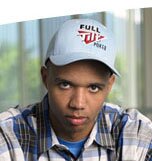John D'Agostino
October 31, 2005
Let's face it; nobody takes up poker because they love the idea of sitting idly at a table while folding for hours on end. But, in a full ring game with eight or nine other players holding cards, it's proper to spend most of your time folding because there's too great a chance that one of your opponents holds a powerful hand.
But, in short-handed play when only three or four people have cards, you're forced to open up. With the blinds coming around so frequently, you need to be playing and winning a number of pots just to stay even. And, with only a couple of opponents, you can be less concerned about running into a big starting hand. On most deals, everyone's holding trash.
Here's some advice for altering your strategy for short-handed no-limit cash games. Keep in mind that all the advice here is geared toward short-handed play while players have deep stacks. The advice given here won't work especially well in a tournament, or against players who come in with less than 100 times the big blind.
My love of short-handed play is one of the reasons I play online so much. It's rare to find a three- or four-handed table in a casino, but online, I can find short-handed games any time I want.
Pre-Flop Strategy
Three- or four-handed games are usually very aggressive, and I will never limp in. I open-raise or I fold. In a typical short-handed game, I'm raising one in every three or four hands when I'm not in the blinds. I recommend raising with every hand you'd raise with in a full ring game (big pair, AK, AQ). In addition, I raise with any pocket pair, including twos and threes. I'll also raise with suited-connectors, such as 4s-5s.
What might be something of a surprise is that I'm extremely wary of hands that seem to hold some promise. Hands like A-J, A-T and K-J, are hands that most know to treat cautiously in a full ring game, but I will often fold these in a short-handed game as well. Why? Well, these are hands that are likely to get me in a lot of trouble. For example, if I were to raise with K-J, and the flop came K-T-3, I'm either going to win a small pot, after betting my top pair and seeing my opponents fold, or I'm going to lose a much larger pot as my decent hand goes down in flames against two-pair, a set, or an out-kicked top-pair.
It's also important to note that A-J, A-T are just about useless against re-raises and must be mucked against most opponents. With a hand like 4s-5s, however, I can call a re-raise with hopes of catching a big flop (two-pair, trips) or a big draw, and then taking my opponents entire stack when I hit. If I miss a flop with a suited connector or manage to hit only bottom pair, I can easily fold to a flop bet. But if I call a re-raise with A-T and then catch top pair on a Ten-high flop, I may get in real trouble against a bigger pair. Or if I flop an Ace, I could be out-kicked.
Post-Flop Strategy
If a pre-flop raise from the cutoff or button has been called by one of the blinds, it's important to make the most of your positional advantage. Keep in mind that in a short-handed game, your opponent isn't likely to hold much of a hand and that even if he held something decent, chances are he missed the flop. (In hold 'em, unpaired hole cards will fail to make a pair on the flop about two-thirds of the time.)
So, if I missed the flop completely while holding something like 6-high, I'll almost always bet the flop. If I get called or check-raised, I'll happily shut down. But, I pick the pot up often enough to make the bet in this situation worthwhile.
If, however, I'm holding a decent Ace and miss the flop, I'll usually check. In a short-handed game, Ace-high can win at showdown, and taking a free card gives me a chance to hit my hand on the turn.
I'll also bet most of my draws on the flop. Often, I'll win the pot with a bet. Even if I'm called, I've got the added benefit of building a large pot. If I happened to hit my draw on the turn or the river, there's a good chance I'm going to take my opponent's stack.
Psychological Strategy
Short-handed play takes some getting used to. The pace is furious, forcing a lot of tough decisions in very short periods of time. The swings are far more dramatic than in a full ring game but, I think that after adjusting to the pace of the action, most players will come to love the excitement that accompanies short-handed play.
John D'Agostino
|



